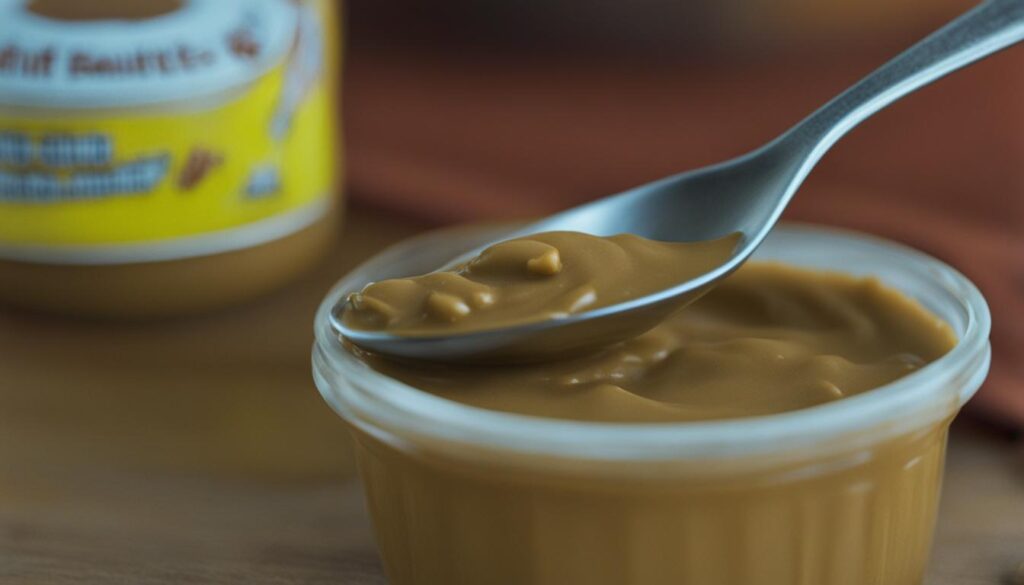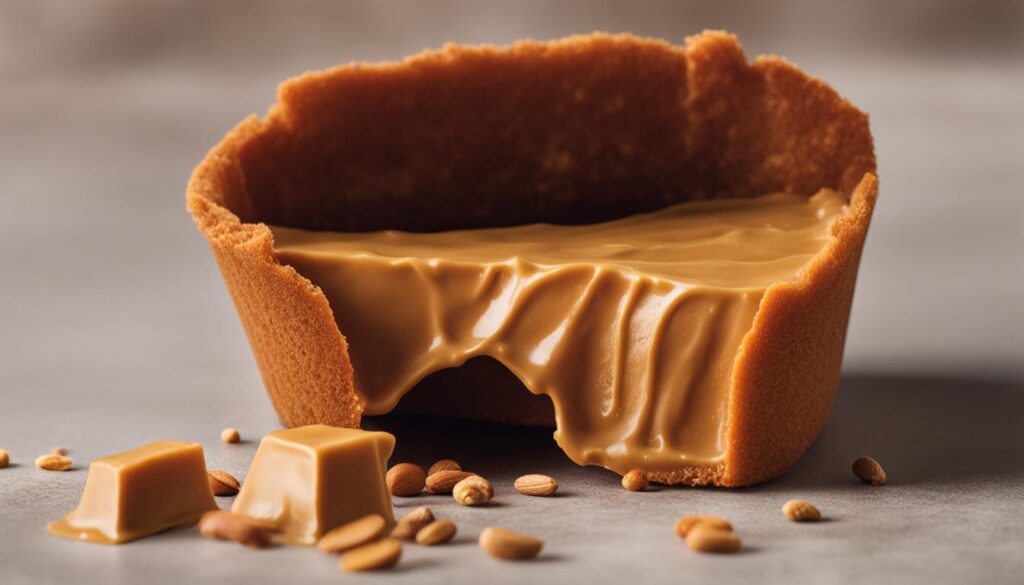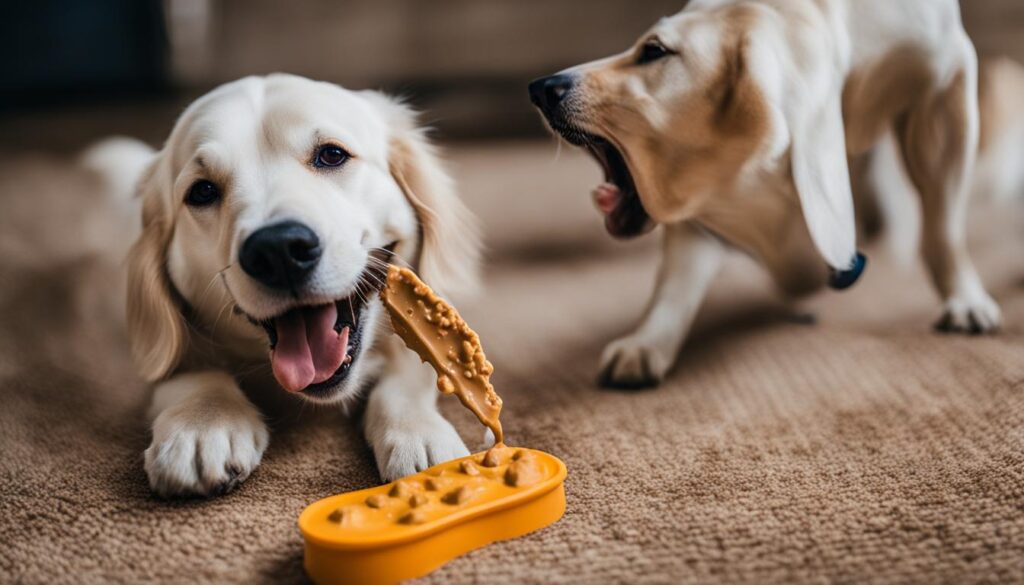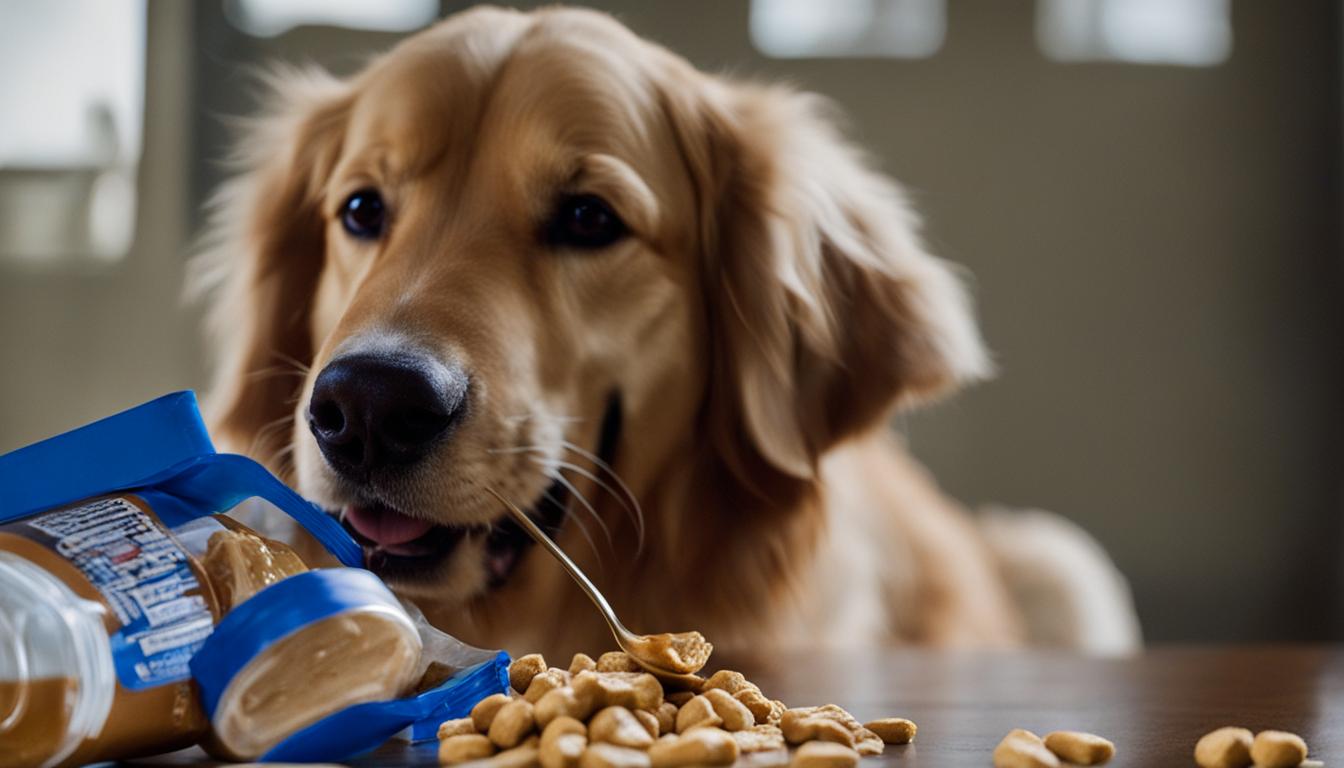Are you wondering if your furry friend can enjoy the nutty goodness of peanut butter? Well, the answer is yes, but with a few important considerations. Dogs and peanut butter can go hand in paw, as long as you make the right choices for their safety and health.
Peanut butter can be a tasty and nutritious treat for dogs when incorporated into their diet in the right way. However, it’s crucial to be aware of potential risks and choose the appropriate peanut butter options for your four-legged companion.
Key Takeaways:
- Most peanut butter is safe for dogs to eat, but it’s important to choose unsalted, dog-specific, or homemade peanut butter.
- High sodium levels, added sugar, and xylitol in certain peanut butter brands can be harmful to dogs.
- Peanut butter can provide health benefits for dogs, including protein, healthy fats, vitamins B and E, and support for immune system function and brain health.
- Peanut butter should be fed to dogs in moderation, making up no more than 10% of their daily caloric intake.
- Some potential risks of feeding dogs peanut butter include weight gain and the toxic effects of xylitol.
Benefits of Peanut Butter for Dogs
Peanut butter can offer several health benefits for dogs, making it a popular and tasty treat option. Here are some key advantages of incorporating peanut butter into your dog’s diet:
- Nutritional Value: Peanut butter is rich in essential nutrients, including protein, healthy fats, and vitamins B and E. These nutrients support muscle growth, promote a shiny coat, and boost overall immune system function.
- Brain Health: Peanut butter contains beneficial lipids and antioxidants that support brain health in dogs. These compounds contribute to cognitive function and help maintain a sharp mind as your dog ages.
- Energy Boost: The high protein content in peanut butter provides a quick and sustained energy source for your dog. This can be especially beneficial during periods of increased physical activity or training sessions.
- Palatability: Dogs often find the taste of peanut butter highly enjoyable, making it an excellent option to encourage them to take medications or as a reward during training sessions.
While peanut butter offers many benefits, it’s essential to remember that moderation is key. Too much peanut butter can lead to weight gain and potential health issues associated with excessive fat and calorie intake. It’s always best to consult with your veterinarian to determine the appropriate serving size for your individual dog based on their size, activity level, and overall health.
“Peanut butter is not only a delicious treat for dogs but also provides valuable nutrients and energy. Just remember to use it in moderation and as part of a balanced diet.”
By incorporating peanut butter into your dog’s diet responsibly, you can enhance their overall well-being and provide a tasty reward they’ll love.
How Much Peanut Butter Can Dogs Eat?
When it comes to feeding your dog peanut butter, moderation is key. The amount of peanut butter a dog can safely consume depends on their size and individual dietary needs. As a general guideline, peanut butter treats should make up no more than 10% of a dog’s daily caloric intake. It’s important to remember that peanut butter is high in fat and calories, so excessive consumption can lead to weight gain and other health issues.
To determine the appropriate serving size for your specific dog, it is crucial to consult with a veterinarian. They can take into consideration your dog’s overall diet, activity level, and any specific health conditions they may have. Additionally, your vet can provide guidance on how to incorporate peanut butter into your dog’s diet in a balanced and nutritious way.
Table: Peanut Butter Serving Guide for Dogs
| Dog Weight | Maximum Daily Serving Size |
|---|---|
| Small (up to 20 pounds) | 1 teaspoon to 1 tablespoon |
| Medium (20-50 pounds) | 1 to 2 tablespoons |
| Large (50-90 pounds) | 2 to 3 tablespoons |
| Giant (90 pounds or more) | 3 to 4 tablespoons |
It’s important to monitor your dog’s overall calorie intake and adjust the serving size accordingly. Remember, peanut butter should be enjoyed as an occasional treat and not as a staple in your dog’s daily diet. By practicing moderation and consulting with your vet, you can safely incorporate peanut butter into your dog’s diet and keep them happy and healthy.
Potential Risks and Precautions of Feeding Dogs Peanut Butter
While peanut butter can be a safe and enjoyable treat for dogs, it’s important to be aware of potential risks and take necessary precautions to keep your furry friend safe. Here are some key considerations:
Potential Risks:
- Xylitol: One of the biggest dangers of feeding dogs peanut butter is the presence of xylitol, a sugar substitute that is highly toxic to dogs. Xylitol can cause a rapid release of insulin in dogs, leading to a phenomenon known as hypoglycemia, which can be life-threatening. Always check the ingredient list carefully and ensure that the peanut butter you choose does not contain xylitol.
- High Sodium and Added Sugar: Many commercial peanut butter brands contain high levels of sodium and added sugar, which can be harmful to dogs. Excessive sodium intake can lead to dehydration and sodium toxicity, while added sugar can contribute to weight gain and dental issues. Opt for unsalted, all-natural peanut butter without any added sugars to minimize these risks.
- Caloric Intake: Peanut butter is high in calories and fat, so it’s important to moderate the amount given to your dog. Overconsumption of peanut butter can lead to weight gain, obesity, and associated health problems, such as diabetes and joint issues. Follow the recommended serving sizes and consult with your veterinarian to determine the appropriate portion for your dog.
Precautions:
- Read Labels: Carefully read the ingredient labels of peanut butter products before feeding them to your dog. Look for brands that are specifically formulated for dogs or those made with just peanuts and no additional additives.
- Consult with Your Veterinarian: Each dog is unique, and their dietary needs may vary. It’s always a good idea to consult with your veterinarian before introducing peanut butter into your dog’s diet. They can provide personalized recommendations based on your dog’s size, age, health condition, and overall diet.
- Moderation is Key: Peanut butter should always be given in moderation as a treat or as part of a balanced diet. It should not replace a dog’s regular meals or make up a significant portion of their daily calorie intake.
By being aware of the potential risks and taking necessary precautions, you can safely incorporate peanut butter into your dog’s diet and ensure their health and well-being.
Table: Risks and Precautions of Feeding Dogs Peanut Butter
| Risks | Precautions |
|---|---|
| Xylitol | Read ingredient labels to avoid xylitol |
| High Sodium and Added Sugar | Choose unsalted, all-natural peanut butter without added sugars |
| Caloric Intake | Moderate portion sizes and consult with a veterinarian |

Choosing the Right Peanut Butter for Your Dog
When it comes to selecting peanut butter for your beloved canine companion, it’s essential to make a well-informed choice. Not all peanut butter is created equal, and certain options may be more suitable for your dog’s health and well-being. Here are some key considerations to keep in mind:
- Opt for unsalted, natural peanut butter: Look for peanut butter that doesn’t contain added salt, as excessive sodium can be harmful to dogs. Natural peanut butter without preservatives or artificial additives is a healthier choice.
- Avoid added sugars and sweeteners: Dogs don’t need extra sugar in their diet. Steer clear of peanut butter with added sugars or artificial sweeteners, as they can lead to weight gain and other health issues.
- Check for xylitol-free options: Xylitol is a sweetener that is extremely toxic to dogs. Ensure the peanut butter you choose is free of xylitol to keep your furry friend safe.
- Consider dog-specific brands: Some peanut butter brands are specifically formulated for dogs, taking into account their unique nutritional needs. These options are often a good choice, as they provide a balanced and safe treat for your pup.
By following these guidelines, you can select a peanut butter that is both delicious and safe for your furry friend. Remember to always read the product label carefully to ensure it meets your dog’s dietary requirements.
| Brand | Unsalted | No Added Sugar | No Xylitol | Dog-Specific |
|---|---|---|---|---|
| Brand A | ✅ | ✅ | ✅ | ✅ |
| Brand B | ✅ | ✅ | ✅ | ❌ |
| Brand C | ❌ | ✅ | ❌ | ✅ |
| Brand D | ✅ | ❌ | ✅ | ❌ |
Remember, not all peanut butter is created equal when it comes to your dog’s health. Choose wisely, and your furry friend will enjoy a tasty and safe treat.
Creative Ways to Incorporate Peanut Butter into Your Dog’s Diet
Peanut butter is not only a delicious treat for dogs, but it can also be a versatile ingredient that adds flavor and nutrition to their diet. Here are some creative ways to incorporate peanut butter into your furry friend’s meals and snacks:
Making Homemade Peanut Butter Dog Treats
One of the easiest and most popular ways to use peanut butter for your dog is by making homemade treats. You can find countless recipes online that cater specifically to dogs, using dog-friendly ingredients. Simply mix peanut butter with other ingredients like oats, pumpkin, or apple to create a tasty and nutritious treat. Make sure to bake or freeze the treats according to the recipe, and your pup will have a homemade snack to enjoy!
Stuffing Peanut Butter into Dog Toys
If you want to provide mental stimulation and entertainment for your dog, consider stuffing their toys with peanut butter. Kong toys, for example, are specifically designed to be filled with treats, and peanut butter works perfectly. Simply smear a spoonful of peanut butter inside the toy and let your dog enjoy the challenge of getting every last bit out. It’s a fun and rewarding way to keep your pup engaged and entertained.
Making Your Own Homemade Peanut Butter
If you want to go the extra mile and ensure your dog is getting the healthiest peanut butter possible, you can even make your own at home. Homemade peanut butter allows you to control the ingredients and avoid any harmful additives that might be present in store-bought options. Simply blend roasted peanuts in a food processor until smooth and creamy. Avoid using salt or sweeteners in the homemade version, as these can be harmful to dogs. Your dog will appreciate the fresh and natural flavor of homemade peanut butter!

Remember, when incorporating peanut butter into your dog’s diet, moderation is key. While it can provide numerous health benefits, peanut butter is also high in fat and calories. Be sure to consider your dog’s overall diet and calorie intake, and consult with your veterinarian to determine the appropriate amount of peanut butter for your furry friend. By using peanut butter creatively and responsibly, you can enhance your dog’s meals and treats while keeping them happy and healthy.
Peanut Butter and Dog Training
Using peanut butter in dog training can be a fun and effective way to reward and motivate your furry friend. The irresistible flavor and smell of peanut butter make it a popular choice among dog owners for positive reinforcement during training sessions. Whether you’re teaching basic commands or working on more advanced tricks, peanut butter can be a valuable tool in helping your dog learn and succeed.
When using peanut butter for dog training, remember to use it sparingly and in combination with other healthy treats to maintain a balanced diet for your pet. Too much peanut butter can lead to excessive calorie intake and potential weight gain. It’s also important to choose peanut butter that is free of harmful additives like xylitol, which is toxic to dogs. Check the ingredient label carefully to ensure the peanut butter you’re using is safe for your furry companion.
To incorporate peanut butter into your training routine, you can use it as a reward for desired behaviors or as a distraction to redirect your dog’s attention during challenging situations. You can apply a small amount of peanut butter to a spoon or your finger and allow your dog to lick it off as a reward. Alternatively, you can smear peanut butter on interactive toys or stuff it into hollow chew toys. This not only provides mental stimulation for your dog but also keeps them occupied and engaged.
Remember, every dog is different, so it’s important to consider your individual dog’s dietary needs, preferences, and any specific health conditions they may have. Consult with a professional dog trainer or veterinarian for personalized guidance on using peanut butter in your dog’s training regimen. With proper use and moderation, peanut butter can be a valuable and tasty tool to help you and your dog achieve training success.

“Using peanut butter as a reward during training sessions can be a game-changer. It’s a great motivator for dogs and can make training sessions more enjoyable for both you and your pet.” – Professional dog trainer
Conclusion
In conclusion, peanut butter can be a delightful and nutritious treat for your furry friend. As long as you choose the right kind of peanut butter, feed it in moderation, and avoid harmful additives, your dog can enjoy the many benefits this tasty spread has to offer.
Remember, when selecting peanut butter for your dog, opt for unsalted and natural varieties without added sugars or preservatives. Be sure to check the label to ensure that it does not contain xylitol, a dangerous substance for dogs.
Additionally, it’s essential to monitor your dog’s serving sizes. Peanut butter should make up no more than 10% of their daily caloric intake. Consulting with your veterinarian can help determine the appropriate amount for your specific pup, taking into account their individual dietary needs and any underlying health conditions.
So go ahead and enjoy sharing peanut butter with your four-legged companion, whether through homemade treats, stuffed toys, or as a delicious reward during training sessions. Just remember to prioritize their safety and well-being by making informed choices and using peanut butter in moderation alongside a balanced diet.
FAQ
Can dogs eat peanut butter?
Yes, most peanut butter is safe for dogs to eat in moderation.
What are the benefits of peanut butter for dogs?
Peanut butter is a good source of protein, healthy fats, and vitamins B and E. It supports immune system function and brain health.
How much peanut butter can dogs eat?
The amount of peanut butter a dog can safely consume depends on their size and individual dietary needs. It should make up no more than 10% of their daily caloric intake.
Are there any risks or precautions associated with feeding dogs peanut butter?
Some peanut butter brands contain xylitol, which is toxic to dogs. It’s important to read ingredient labels and avoid peanut butter with xylitol. Peanut butter should also be fed in moderation to avoid weight gain and other health issues.
How do I choose the right peanut butter for my dog?
Look for unsalted, natural peanut butter without added sugars, salt, or preservatives. Organic options and dog-specific peanut butter brands are often a good choice. Make sure to check the product label for xylitol.
How can I incorporate peanut butter into my dog’s diet?
You can use peanut butter to make homemade dog treats, stuff it into dog toys for mental stimulation, or even make your own peanut butter using dog-friendly ingredients.
Can I use peanut butter for dog training?
Yes, peanut butter can be a useful tool in dog training due to its palatability. However, it should be used sparingly and in combination with other healthy treats.
What is the final conclusion about dogs and peanut butter?
Peanut butter can be a safe and enjoyable treat for dogs when given in moderation and without harmful additives like xylitol. Always prioritize your dog’s safety and health.





